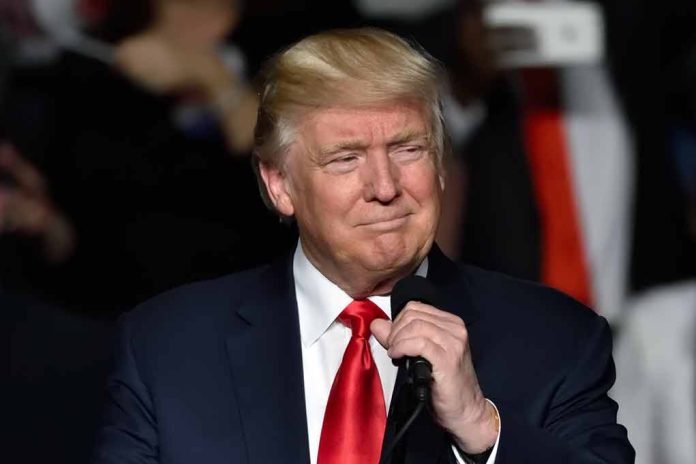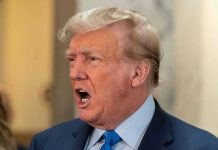
President Trump has shocked international observers by meeting with Syria’s jihadi-linked interim President Ahmed al-Sharaa in Saudi Arabia, offering sanctions relief and the possibility of normalized relations despite the leader’s controversial past as a designated terrorist.
Key Takeaways
- President Trump met with Syria’s interim President Ahmed al-Sharaa in Saudi Arabia, marking the first face-to-face meeting between U.S. and Syrian leaders in 25 years.
- Trump plans to drop U.S. sanctions against Syria and explore normalizing relations with Damascus, potentially bringing Syria into the Abraham Accords.
- Al-Sharaa (formerly Abu Mohammed al-Jawlani) was previously designated a global terrorist by the U.S. in 2013 and led a group linked to al-Qaeda.
- Israeli Prime Minister Benjamin Netanyahu opposes lifting sanctions on Syria due to security concerns.
- The meeting represents a significant shift in U.S. foreign policy away from nation-building approaches in the Middle East.
Historic Meeting Signals Major Policy Shift
President Donald Trump’s meeting with Syria’s interim President Ahmed al-Sharaa marks a dramatic turning point in U.S.-Syria relations. The encounter in Saudi Arabia represents the first face-to-face meeting between American and Syrian leaders in 25 years. During the high-stakes diplomatic session, Trump announced his intention to drop sanctions against Syria and explore normalizing relations with Damascus. This bold diplomatic move comes just months after al-Sharaa overthrew the Assad regime in December 2024 and established a new government structure in the war-torn nation.
Trump praised al-Sharaa as a strong leader during their meeting, expressing optimism about Syria’s future under his leadership. The President’s decision to engage with the Syrian leader comes as part of a broader strategy to reshape Middle Eastern alliances and reduce Chinese and Iranian influence in the region. According to reports from the meeting, a key component of Trump’s offer involves Syria potentially joining the Abraham Accords and normalizing relations with Israel, a development that would fundamentally alter the geopolitical landscape of the Middle East.
The Controversial Past of Syria’s New Leader
The diplomatic overture has raised eyebrows among security experts due to al-Sharaa’s controversial background. Before becoming Syria’s interim president, al-Sharaa was known as Abu Mohammed al-Jawlani, leader of the insurgent group Hayat Tahrir al-Sham (HTS), which maintained ties to al-Qaeda. The United States designated HTS as a foreign terrorist organization in 2014, and al-Sharaa himself was listed as a Specially Designated Global Terrorist in 2013, designations that remain in effect today despite his rise to power in Syria.
Al-Sharaa now leads a military junta in Syria and describes his position as “interim” president, promising to hold elections within four years. In his bid for international legitimacy, he claims to have severed all ties with terrorist organizations and expressed commitment to building an inclusive government. The White House has outlined specific requirements for Syria under al-Sharaa’s leadership, including deporting Palestinian terrorists, managing ISIS detention centers, and improving relations with Israel as prerequisites for continued U.S. support.
Trump announces U.S. will remove all sanctions against Syria to give the country ‘a chance at a greatness’ https://t.co/3TPLoic4Sh
— The Washington Post (@washingtonpost) May 13, 2025
International Reactions and Strategic Implications
Not all U.S. allies are enthusiastic about Trump’s diplomatic initiative. Israeli Prime Minister Benjamin Netanyahu has expressed strong opposition to lifting sanctions on Syria, citing serious security concerns about al-Sharaa’s past affiliations and current intentions. Despite these reservations, Trump has already discussed the sanctions relief plan with Saudi Arabia’s Crown Prince Mohammed bin Salman and Turkish President Recep Tayyip Erdogan, suggesting a broader regional consensus may be forming around the new approach to Syria.
Media outlets including Al Jazeera and the Jerusalem Post have characterized the meeting as a significant diplomatic breakthrough that could legitimize Syria’s new government on the international stage. The Trump administration’s willingness to engage with al-Sharaa represents a notable departure from previous U.S. policies of nation-building in the Middle East, instead embracing a pragmatic approach that allows Syria to determine its own future while encouraging regional stability through diplomatic and economic incentives rather than military intervention.
Path Forward for U.S.-Syria Relations
The potential inclusion of Syria in the Abraham Accords represents a strategic victory for Trump’s Middle East policy, as it would further isolate Iran and reduce Chinese influence in the region. During their meeting, Trump emphasized that Syria must take concrete steps to improve relations with Israel and contribute to regional stability before sanctions can be fully lifted. This conditional approach reflects the administration’s attempt to balance diplomatic engagement with security concerns about Syria’s new leadership.
As Syria emerges from years of civil war under new leadership, the international community watches closely to see if al-Sharaa can transform from a designated terrorist to a recognized head of state. Trump’s willingness to engage with the controversial leader highlights his administration’s preference for realpolitik over ideological purity in foreign affairs. The coming months will reveal whether this gambit succeeds in bringing stability to Syria or faces significant pushback from Congress and international partners concerned about legitimizing a leader with ties to extremist organizations.
Sources:
- Trump announces U.S. will remove sanctions on Syria
- Trump to remove US sanctions on Syria in major policy shift | Reuters
- Trump Meets with Syria’s Jihadi President, Offers Dropped Sanctions and Normal Relations



